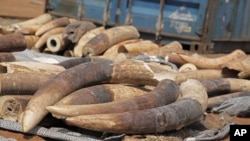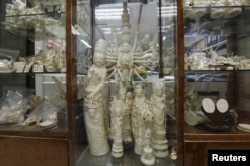Conservation group Save the Elephants says Vietnam is one of the world’s biggest illegal ivory markets, becoming popular among Chinese buyers. The group says in the past eight years the number of ivory items for sale has increased more than six times.
Ivory demand high in China, Vietnam
Save the Elephants researcher Esmond Martin said 60 percent of the ivory tusks sold in Vietnam were from African ports located in the Indian Ocean.
“About two-thirds of ivory that is leaving the continent is going to the East African ports, mostly Mombasa and Dar es Salam, into a lesser extent in Zanzibar and two-thirds of ivory that leaves Africa is going to China and Vietnam," Martin explained. "Now the big difference between China and Vietnamese market is the China market on the retail, legal side and perhaps on the illegal retail side has been going down but the Vietnam market its been absolutely booming.”
The group's report "Vietnam’s Illicit Ivory Trade" documented more than 16,000 ivory items on display ready for sale in three towns and its surroundings. In a similar report in 2008, 2,400 items were on display in the same locality.
The investigators noted lack of law enforcement and corruption contributed to the expansion of the ivory trade in Vietnam. They also found an increase in Asian tourists has driven up demand.
Lax laws across the border
Over the past couple of years, the Chinese government has clamped down on the illegal elephant ivory trade, in turn, Chinese ivory buyers have crossed the border into Vietnam stated researcher Lucy Vigne.
“In China because of the cost of bureaucracy every item of the sale in an illegal outlet has to have an identification card. This is not required in Vietnam, so the cost of bureaucracy, the cost of labor, the overhead is so much higher," she said. "Prices in China are far higher than in Vietnam that is why Vietnam is a major place for mainland Chinese to come down and buy ivory out of their country illegally.”
The Save the Elephants report says 75 percent of the ivory buyers in Vietnam come from China.
Craftsmen in Vietnam earn an average of $260 a month. In China, an artist makes at least $800.
The founder and the head of Save the Elephants, Iain Douglas-Hamilton, stressed the need to close new markets emerging in Asia.
“The study is a warning that when you think you are on the verge of solving a problem, it may shift across to the borders of other states ... in this case, the problem now of illegal ivory trading has shifted across the border with Vietnam … so really the only hope is to bring down that demand and bring down the desire for ivory, and this has been widely recognized by China and America,” Hamilton said.
In the past couple of years, the price of ivory, especially in China, has tripled to $2,000 per kilogram.
It is estimated that 100,000 African elephants were killed between 2010 and 2012.






